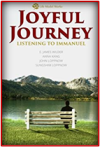Finding Joy in the Journey
Instructions - Part 1
John 8:11
“Go now and leave your life of sin.”
~Jesus,

How Do I Participate?
During the next 30 days, we will intentionally build joy into our lives using a challenge called Finding Joy in the Journey. The goal is to engage in a 5-minute session focused on joy – three times a day. While any time of day will work, we encourage you to slate one at the start of your day and one near the end; then drop the other where it best fits. Again, this is simply a suggestion. And if you miss one (or two) in a day, don’t despair. Just re-joy-ce by jumping back in the next day.
What Do I Need?
We are providing the 30-day booklet and have purchased the Joyful Journey book that accompanies the 30-day challenge. If you are not the reading type, take a breath. You will be reading less than 15 pages PER WEEK – but they are important pages. You will see a second book quoted, The 4 Habits of Joy-Filled People. We have taken the liberty to purchase these too. It is an easy read and meshes well with the theme. Reimbursement for the books would be appreciated but not necessary. A journal is recommended strongly. A partner (or partners) will GREATLY enhance this experience. And – a willingness to participate is helpful 😊.
When Do We Start?
The actual 30-day challenge begins on November 1st and starts in your booklet around page 10. What precedes this is an explanation spread out over a “prep week” built to practice intentionality as you ramp up for this new habit. To do that, our plan is to engage in the booklet once a day, taking time to think about a joy moment and read through that day’s part of instructions. Because some of you prefer options, here is your first one: The introductory material can be read in one sitting rather than over a week, but the challenge itself is built on daily participation. Off we go!
John 15:11
I have told you this so that my joy may be in you and that your joy may be complete.
~ Jesus
Jouney Instructions
Much of the Joy Challenge will be explained as you go, but Week One will focus on building joy by compiling personal stories of joy from your past. These sources of joy can be one-time events or repetitive experiences. More specific tasks arise once we get into the second week of reading. After that the days will flow with a distinction between sessions.
Session A will focus on joyful or appreciative memories of your past. They can be a recent as yesterday or back to the days of childhood.
Note: If your childhood (or other season of life) happens to be full of joyful memories, then absolutely include some of your joys from that time. If that period of memories is painful, avoid that arena for this week. We can draw joy memories from other seasons of life.
For future use, you will be compiling these Joy Moments into a list either in this booklet or on your phone. We are calling them a Golden Moments list to be explained later. The list can be found on p. 32 of the booklet.
During these five-minute joy windows, you can sit, walk, lay back, etc. The goal is to talk about (or think) of something or someone that brings you joy. The Joy Challenge has proven scientifically to re-wire the brain, teaching it (you) to look for joy in whatever environment you happen to be in.
You will find a joy-focused bible verse included with each session. Why? To help you connect this wonder of brain science with your faith life – and see this re-wiring as the handiwork of God our Father who has “wired us” for joy. One user describes the benefit of this God-design as “living at the speed of joy.”
Often when we are not in a good mindset, bringing to mind joyful moments or opportunities can be difficult. This is one reason we create a list ahead of time.
At times, when we participate in exercises like this booklet encourages, we are asked to dig into our past and can be reminded of traumatic experiences. This can create the opposite sensation we seek in recalling joyful moments in life. What to do?
To assist us in navigating these traumatic memory intrusions, try using what is called an anchor memory. This is a time or place that, when we recall it, brings a sense of peace over us. When I envision sitting on the front edge of a boat on the Sea of Galilee, feet dangling over the water, I feel peace. I can even envision Jesus on that lake. I smile even as I type this. If God is present with you in your anchor moment, all the better. But not to worry, not everyone has such a memory with God present in this way. Any memory that produces a sense of peace or appreciation will work. This becomes your anchor memory, a time you draw on to settle your spirit when you are beginning to feel overwhelmed by other emotions.
In fact, this idea of returning to moments of appreciation are helpful any time. They are like gifts from God. According to Neuro-theologian Jim Wilder, we should start our times of exploration and healing by returning to times and memories where we know God best. From these good memories we can better explore other memories where we do not currently perceive God’s presence in the painful memory. See Immanuel Healing, a Six-Step Process for Resolving Trauma.
1 Corinthians 2:11b-12,15
The Mind of Christ
Who knows a person’s thoughts except their own spirit within them? In the same way no one knows the thoughts of God except the Spirit of God. What we have received is not the spirit of the world, but the Spirit who is from God, so that we may understand what God has freely given us… we have the mind of Christ.
We can know the thoughts of God the Father with the help of God the Spirit through the mind of
Jesus Christ.
That is a scriptural teaching.
Session B will focus on what is called the thought-rhyming portion of Immanuel Journaling, described on pages 33-46 of Joyful Journey and defined on page 72. It is built around five phrases viewed from God’s perspective. Journal entries are usually one or two sentence “thoughts” in the following areas: I SEE YOU, I HEAR YOU, I UNDERSTAND YOU (How big or hard it is), I AM WITH YOU and I CAN DO SOMETHING ABOUT YOUR SITUATION (what you are going through).

This is a good time to introduce the book titled Joyful Journey, Listening to Immanuel. It was written collaboratively by James Wilder, Anna Kang, John and Sungshim Loppnow. Total reading per week will run less than 15 pages. Quotes from the book have been dropped into your daily reading material.

This thought bubble will represent opportunities to receive or seek out the thoughts of God, a regular part of the Immanuel experience you are learning.
Psalm 107:1
Give thanks to the Lord, for He is good.
Session C will provide opportunity to reflect on the day with gratitude. As with Session A, moments can be drawn from that day, week, or a lifetime ago. This session introduces you to interactive gratitude, a practice described on pages 21-22 of Joyful Journey and defined on page 71. You will benefit from a journal for this. This skill is described by Dr Jim Wilder:
[He] further emphasizes the importance of skill 4 saying that if we practice feeling appreciation for five or more minutes three times a day, any time of the day, our brain will reset normal to appreciation (from RARE leadership). Can you imagine your "go to" state as appreciation instead of anxiety, anger, despair, or some other negative emotion?... Skill 4 helps us feel seen and valued as though we belong. In fact, belonging can be created by a simple compliment. Unfortunately, for many of us appreciation does not fit with our learned responses. It is all too easy to think about and expect pain, distrust, anger, resentment and bitterness instead of joy. We all know someone who is grumpy, bitter and unforgiving. The poor brain that lacks skill 4 will focus on pain, problems, and the past instead of expecting good things. When this happens, negative emotions can define their personality. Thankfully, appreciation rewires the brain and restores vision for the downtrodden soul so we can go out today and give a hug, extend a compliment and find something good to remember and share. Neurons that fire together wire together, and how often you do something sets the tone for what your brain expects. Appreciation resets the thermostat for your nervous system.
p. 55, Coursey, Transforming Fellowship.

Prayer Prompt
What are you giving thanks for today -- to God?